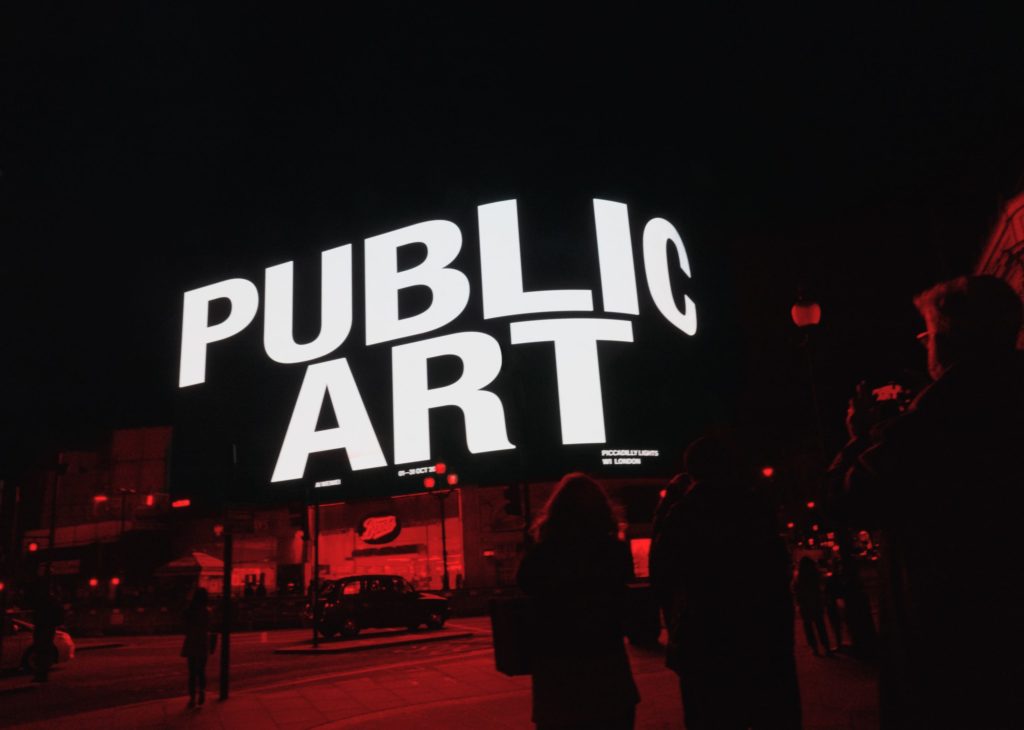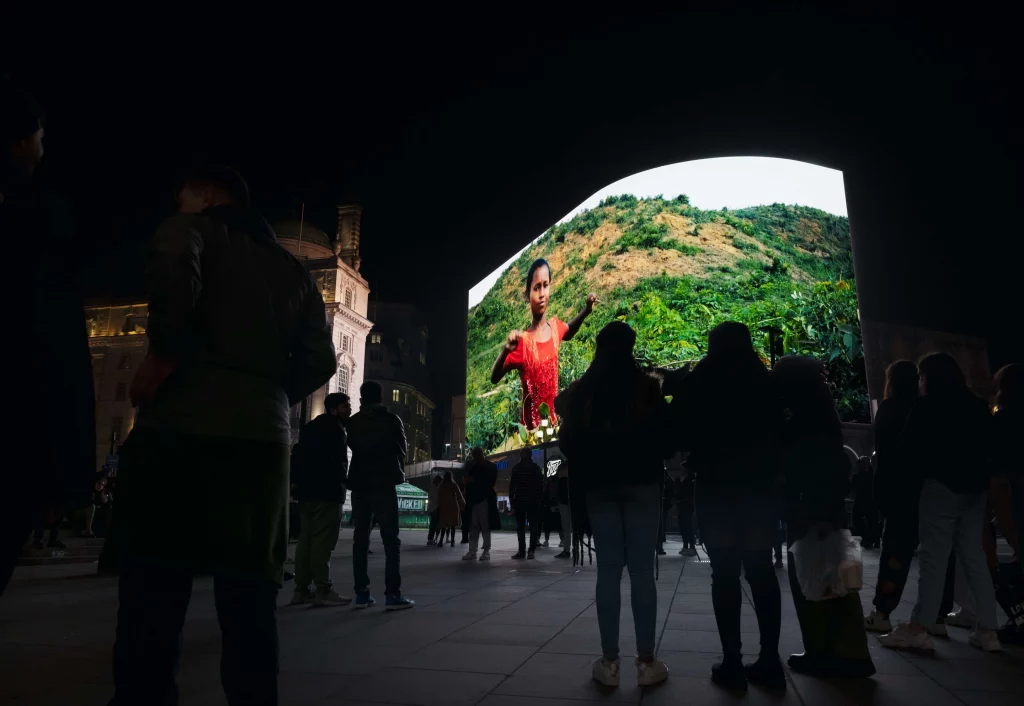Ai Weiwei: Flow of Quotation
Written by Gertrude Gibbons

Quotes flow through these thirty video works by Ai Weiwei as a consistency, forming a narrative through the fragments of film. At times the words repeated are his own; at times they are echoes of other voices from the past including his father, the poet Ai Qing. The quotations appear across the images, at varying stages, alternately contrasting or merging with the colours and motion of the background.
Quotation offers repetition, authority, validation, direct speech. It suggests an uprooting from a different time or place and a re-situation into the current one. It brings something past, or distant, into the present; quotes offer the possibility of uniting disparate times, places or contexts. As a form of validation, quotation can be a powerful device and means of persuasion. Here in Ai Weiwei’s video works they seem to act as epigraphs to films rather than explanations of them; and their sparing but consistent use gives the words an authority. Quotation also offers itself up for further quotation; it hints at future repetition. Traditionally, wise or validating quotations, like the citation of a proverb, unite people via common reference, bringing familiarity and a gateway into something new. (Quote accompanying Public Art “I think of every attempt I make as a wish to open a door.”) Written rather than spoken aloud, the quotes contain a sense of silence, or a pause, as people read collectively in their heads. By frequently quoting himself, but not ascribing his name to these quotes, Ai Weiwei gives way to expression without binding himself individually and restrictively to the words; his own speech is freely repeated within and alongside these works, given precedence over the name that writes them. Rather than an autographed opinion, it is a provocation to repeat, to speak further with and from other names and voices.
The absence of his own name in this case also recalls the silence surrounding Ai Weiwei’s name in his native country, and attempts to erase it. When Berlin, I love you was submitted to the Berlin film festival, the producers were told that with Ai Weiwei’s episode and name there, it would never be accepted. As the producers later admitted, China’s power had been underestimated; its censorship is not limited to its nation’s borders, and here their fist extends into the West, into Germany.1 Ai Weiwei’s name, even outside his native country, was forcibly omitted and erased. Scenes from this censored film, written with Ai Weiwei’s partner Wang Fen, shown on the screen at Piccadilly as Berlin, starring their son Ai Lao. He cycles on a rainy day beside the remains of the Berlin wall. He pauses to communicate wordlessly with a stranger on a bench; they exchange smiles and he cycles on. Its atmosphere is magical and mysterious as the young child finds an old Deutsche mark coin from 1953, and arrives at a darkened street stall filled with random curiosities. Picking up an animal skull from the stall, there is a collision between the inquisitive young face with this hollow-eyed dead creature. He puts the inanimate old object back on the red cloth and turns instead to the man playing accordion. Putting the found coin in the player’s waiting hand, the player tells the boy, “this country doesn’t exist anymore”. In a magic trick, the coin vanishes, replaced by a shining chain the man tells the boy to take.

The greyness of daylight returns again and the boy is cycling, past the iconic German landmark of the Brandenburg Gate. The child cycles past this symbol of a doorway, an old symbol of a divided city, and now the symbol of New Berlin’s unity. Repeated close attention to his peddling gives a sense of balancing alternation or division, heightened by his different coloured shoes. Its accompanying quote appears: “Freedom of speech is the right from which all others flow”. The past vanishes in the objects that mark it, but it is remembered through speech. Freedom of speech is an open gate, and unification of difference, it is the foundational basis for all other rights. Yet it is always at an edge: the boy cycles a perimeter and boundary. The gate can easily be shut, as it was for this film in Berlin: “You can never take freedom for granted. It rots immediately” (quote for Big Tree).
These borders and boundaries, via art, have the potential to be destroyed. Ai Weiwei answers a question from Alexandra Pringle in the Guardian: “art can break boundaries: there’s no “refugees” or other names, even “terrorists”, we’re all human”.2 Names in the restrictive sense do not exist in art: walls break down between languages, cultures, and definitions. In the last film, Mountains and Seas, which makes use of an ancient text’s (the Shanhaijing) enduring means of expression through mythological creatures, the quote follows: “We cross the same mountains; we cross the same rivers”. This borderless belonging that art has the power to evoke should be at the core of humanity; it should “live in the heart of the people”, and belong to all.3 These screenings enable an open dialogue in the form of a gathering via its public space from the street and online. It asks not be caged or assigned a separate place of belonging. “I am a cage in search of a bird”, Ai Weiwei quotes Franz Kafka in Laziz. The cage searches the bird; the enclosure searches its object to enclose. The silent words search for a bird to fill them, emblematic of freedom. Along with the consistent silently written quotes, the video works convey something of a hole, something missing. In Diary of an Unknown, Jean Cocteau writes of “the shape of emptiness, an emptiness having shape, an emptiness in a void, an emptiness that tortures us because it outlines that which should be, yet the phantom article refuses to name itself”.4
Ai Weiwei works against the refusal to name. The “phantom article” might literally be a refused name or a refusal to name, but Ai Weiwei’s video works name that refusal at its missing point. A country, life, object, or past “no longer exists”; but this phantom is carried along the frontier of the freedom of expression, and the memory, recitation, and re-situation of words. Expression comes through and from the silence, the missing parts and names, the unidentified voices.
1 Ai Weiwei’s segment was cut from ‘Berlin, I Love You’ to appease China, artist and producers say; Ai WeiWei: ‘Berlin, I Love You’ censored following Chinese pressure | DW News
2 Ai Weiwei: ‘An artist must be an activist’
3 Ai Weiwei on his new life in Britain: ‘People are at least polite. In Germany, they weren’t’
4 Quoted in Cornelia A. Tsakiridou, Reviewing Orpheus: Essays on the Cinema and Art of Jean Cocteau. Bucknell University Press, 1997.